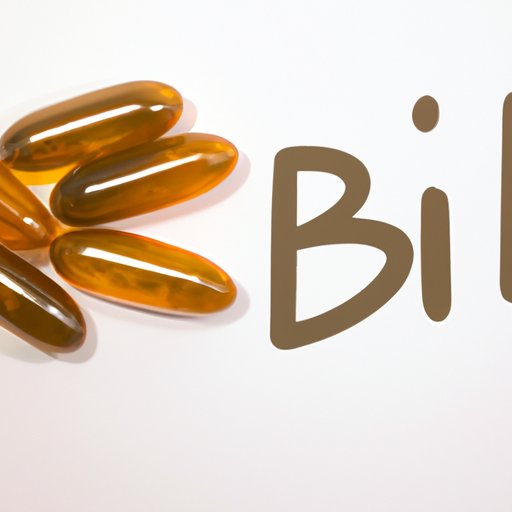
Introduction
There seems to be a lot of confusion about whether biotin is a vitamin or not. Some swear by its benefits, while others remain skeptical. This article aims to explore and clarify the classification of biotin as a vitamin, as well as its role in promoting health and wellness. Whether you’re someone who’s considering supplementing their diet with biotin or just looking to learn more about vitamins and nutrition, this article is for you.
The Truth About Biotin: Unveiling Its Classification as a Vitamin
Biotin, also known as vitamin B7, is a water-soluble vitamin that helps the body convert food into energy. It’s classified as a vitamin because it’s essential for human health, and the body cannot produce it on its own.
Some of the known health benefits of biotin include aiding in metabolism, maintaining healthy skin and hair, and promoting the health of nails. Biotin plays a crucial role in keeping our nervous and metabolic systems functioning properly. However, unlike other vitamins, we don’t need large amounts of biotin to be healthy.
The recommended daily intake of biotin is around 30 mcg per day for adults. It’s found in many foods, including egg yolks, nuts, whole grains, and organ meats such as liver. However, it’s worth noting that biotin deficiencies are rare, and most people obtain the necessary amount of biotin from their daily diet.
Why Is Biotin So Good for Our Body?
Biotin is involved in a variety of essential bodily processes and functions. This water-soluble vitamin is crucial in the synthesis of fatty acids, amino acids, and glucose. This B-vitamin also supports healthy functioning of the nervous system by aiding in the regulation of neurotransmitters.
Biotin is especially important for healthy skin, hair, and nails. Many hair and nail supplements in the market contain biotin due to its effectiveness in promoting healthy growth. In fact, a lack of biotin can lead to hair loss and an overall dull complexion.
In addition, biotin supports a healthy metabolism by helping the body break down carbohydrates, proteins, and fats. This is one reason why biotin is often included in weight loss supplements. Supplementing with biotin can give an extra boost to the body’s natural metabolism, leading to potential weight loss benefits.
Is Biotin a Vitamin or a Supplement? An Analysis of Its Legitimacy
When discussing biotin, one may wonder whether it can be classified as a vitamin or a supplement. Vitamins are organic compounds that our bodies require in small quantities for normal functioning. On the other hand, supplements are products that contain one or more vitamins or minerals and are sold in the form of pills, powders, or liquids.
Based on this definition, biotin can be classified as a vitamin. Biotin is required by the human body to function properly, and we cannot produce it on our own. However, biotin can also be sold as a dietary supplement in the form of capsules or tablets.
Despite being classified as a vitamin, some may argue that biotin is simply a supplement marketed as a vitamin. But biotin’s essential role in normal bodily functioning and the fact that it’s not produced by the body itself suggest that it is, in fact, a vitamin. Ultimately, whether you choose to consume biotin through your diet or through supplements, it remains an essential nutrient that plays an important role in overall health.
How to Incorporate Biotin into Your Diet: A Nutritional Guide
Incorporating biotin into your diet is relatively easy, as it’s found in many common foods. Some of the best biotin sources include egg yolks, nuts, legumes, whole grains, meat, and dairy products. While deficiencies are rare, certain individuals, such as pregnant women, may require higher amounts of biotin. It’s always a good idea to consult a healthcare professional to determine if biotin needs to be supplemented in your diet.
If you want to increase your biotin intake, consider incorporating the following foods into your diet:
- Salmon
- Avocado
- Sunflower seeds
- Cauliflower
- Bananas
If you’re considering taking biotin supplements, it’s essential to do your research and buy a high-quality product from a reputable supplier. It’s also important to take the recommended dosage and not exceed it without consulting a healthcare professional first.
Busting the Myths of Biotin: Separating Fact from Fiction
As with any nutrient, there are many misconceptions and myths surrounding biotin. Let’s take a look at some of the most common ones:
Myth #1: Biotin can cure hair loss
While biotin is effective at promoting hair health, it’s not a magic cure for hair loss. Hair loss can be caused by a variety of factors, including genetics, stress, and medications. While biotin may help with hair growth, it’s not a guaranteed solution for hair loss.
Myth #2: Taking more biotin will lead to faster results
Taking excessive amounts of biotin won’t necessarily lead to quicker or better results. In fact, exceeding the recommended daily dosage can lead to biotin toxicity, which can cause skin rashes and acne. It’s always important to take the recommended dosage and not exceed it without consulting a healthcare professional first.
Myth #3: All biotin supplements are created equal
Not all biotin supplements are created equal. Some supplements may contain fillers or additives that can cause allergic reactions or other unwanted side effects. When choosing a biotin supplement, make sure to read the label carefully and do your research on the brand and supplier.
Conclusion
Biotin is a vitamin that plays a crucial role in maintaining overall health and wellness. It’s involved in many essential bodily processes and functions, including the maintenance of healthy skin, hair, and nails, and supporting the nervous and metabolic systems.
Whether you choose to obtain biotin through your diet or supplements, make sure to do your research and consult a healthcare professional to determine what’s best for your individual needs. By understanding the true benefits of biotin as a vitamin, we can make informed decisions about our health and wellness.





